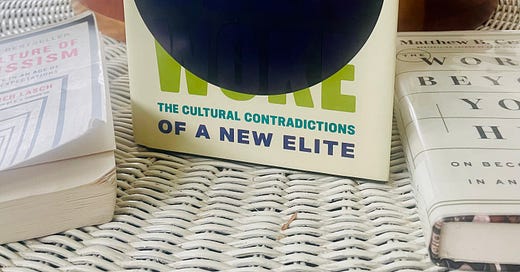Get a discount on annual subscriptions here!
In six chapters, sociologist professor
has written the clearest work on the actual operation of the so-called “woke” professionals–who have introduced confusion on issues of justice, injustice, and inclusion into the galaxy of American elite commercial, cultural, and intellectual institutions, and who have provoked a powerful rightwing backlash that contributed to the rise of Trumpism and the post-liberal movement.To Professor al-Gharbi, the woke professionals are almost entirely “symbolic capitalists”–those who work in fields that give them a higher social status than blue-collar workers, and whose jobs require them to work with ideas, data, narratives, and symbols and do not produce physical goods and services. In short they derive power and influence primarily from cultural, intellectual, or social prestige rather than from direct economic assets. They are a supposed elite who lack the economic security of the real controlling elite (the “superelite”). Consequently, the woke are anxious status chasers. The number of professions placed within this category is–in my opinion–too great, and the analysis of their distinctions too few. But rather than spend time debating the appropriateness or utility of the term symbolic capitalist, let’s focus on how this group fits within al-Gharbi’s broader analysis of wokeness and its relevance to American identity and intellectual history.
We Have Never Been Woke is an analysis that defies categorization as a right- or left-wing critique of the White symbolic capitalist-dominated woke movement–in part because these terms have come to lose their meaning in contemporary America. But if we were to categorize it, it fits more neatly with a classic or old left critique. On the one hand, his critique of the consequences of feminism in elite spaces sounds like early Jordan Peterson, namely in his assertion that the woke valorization of victimization epistemology stems from organizational behaviors associated with women, and not traditional Western male culture. What rightwing critics of wokeness call passive-aggressive manipulation and organizational bullying through forced agreement, al-Gharbi sees to be linked to differences in the ways men and women handle conflict and seek compliance.
However, unlike what you would expect from most rightwing grievance literature, We Have Never Been Woke points out that, in reality, these changes have had relatively little actual negative impact on elite White men. In fact, I would offer to al-Gharbi that his analysis seems to be compatible with that of many in the radical tradition in so far as he highlights how White women are unique contributors to racial oppression because of their ability to be portrayed as both victims and victimizers, and thus to escape scrutiny for their negative behavior. Some might go so far as to proffer that toleration of institutional woke behavior by White men in authority–who understand the game–is a method of managing White women by granting them status while maintaining the highest level of power and wealth for White men.
While the earlier chapters are mainly conceptual, the latter chapters flesh out these concepts in a way that appeals to me as a fellow academic–though it will likely also resonate with non-academics. When al-Gharbi relates his experiences of woke hypocrisy and manipulation in the wake of the 2016 Trump victory, I am reminded of the day after the election when a straight White male professor simply canceled his classes because he just could not bear to go to work when Trump won. I joked that day with my students that “the white privilege stuff was amazing, you can just give yourself a day off when another white guy wins the election,” as I had no patience with a full-timer taking a day off when I, as a Black adjunct, knew I needed to show up and work.
Also, why would I let an election scare me out of the classroom my forebears marched for me to be included in? We Have Never Been Woke explicitly states that when woke folk, especially Whites, complain of being oppressed–when in reality they aren’t–they are doing it as a flex; it’s a good look for them to do so. And they can afford to ostentatiously perform their victimhood because it does not actually harm them; it costs them nothing, as there is little to nothing at stake for them. they have no skin in the game. Their refusal to conform to normal expectations is in reality a demonstration that they are special and privileged–take their skipping work, when a minority administrative assistant could never have gotten away with doing so.
We Have Never Been Woke also looks at how this new sub-elite engages in gatekeeping through constant language shifting. Al-Gharbi notes that in Loudoun County, Virginia (the neighboring county to my home county of Fairfax) there was a backlash against the increase of wokeness in school language and curricula. Wryly, he points out that the backlash occurred despite the evidence that wokeness would not actually harm the prospects of the children in the schools, but rather would likely enhance it due to the fact that wokeness is the language of the new elite. Mastering the language of the elite is beneficial for the parents of kids in America’s wealthiest county who aspire to positions in the elite.
On one hand, the events that transpired in the county post-desegregation fostered a skepticism toward schooling in general (homeschooling has a sizable constituency there), thus fanning the flames of their culture warring instincts. Yet it’s also worth noting how this opposition to wokeness functions as a form of gatekeeping. Symbolic capitalists are uniquely vulnerable to competition. They are not as special as they would like to think, and many appear to use wokeness as a way to limit the competition from those who are competent but who will not conform to PC orthodoxies. They are exclusionary because they fear meritocracy will supplant them. While al-Gharbi grants they are often blind to their ambition by their earnestness, I am not so sure that this occurs quite so unconsciously.
America is a large country, but technology’s capacity to shrink distance has contributed to this dynamic as much as the increase in women among the sub-elite. Modern American elites, though more racially and ethnically diverse, have become more intellectually and culturally homogenous due to technology and nationalization. Unlike earlier generations, where regional elites with distinct perspectives competed for influence, today’s elites are concentrated in a few urban centers and connected through telecommunications, the ease of air travel, and digital platforms. This has led to ideological conformity, reducing the diversity of thought in elite spaces. The decline of local power structures and local and regional independent media has further eroded competing perspectives, making the modern elite class more centralized and insulated despite its demographic diversity. They are in this respect unlike the old WASPs.
I would ask al-Gharbi how the inclusion of new groups–not just racial minorities, but also newly educated Whites, those whose first family members attended college with G.I. Bill, and elites from immigrant backgrounds post-1965–also exacerbate the old guard’s fear of losing their positions. Before the mid-20th century, higher education and the jobs associated with a college degree were truly exclusive. After the Second World War, the symbolic professions were opened to the formerly excluded, and many still suffer from outsider and imposter syndrome. You have greater numbers of symbolic capitalists, but the assimilation of minorities, women, and working-class white males has perhaps been more haphazard than we are willing to admit.
In the constant positioning for moral authority, it seems many are exposing their insecurities in elite spaces. They do not exude the comfort and confidence with their positions that were the norm of the old WASP patricians. And they have never been woke; rather they are playing a role to maintain their precarious statuses. Are they adopting every elite trend because many do not know how to be elite Americans? Is wokeness a–hopefully temporary–problem of America’s celebrated social mobility? Do we have a Novus homo problem?
This reminds us of Alexis de Tocqueville’s analysis of how America’s powerful social bent toward democratic equality and opportunity inhibited intellectual independence.
In the United States the majority undertakes to supply a multitude of ready-made opinions for the use of individuals, who are thus relieved from the necessity of forming opinions of their own. Everybody there adopts great numbers of theories, on philosophy, morals, and politics, without inquiry, upon public trust...The fact that the political laws of the Americans are such that the majority rules the community with sovereign sway, materially increases the power which that majority naturally exercises over the mind. For nothing is more customary in man than to recognize superior wisdom in the person of his oppressor...In the principle of equality I very clearly discern two tendencies; the one leading the mind of every man to untried thoughts, the other inclined to prohibit him from thinking at all.
De Tocqueville visited Jacksonian America, a country transforming through industrialization and democratization. As established majority opinions monopolized power and authority, new men feared being a minority, which led to many simply adopting whatever the dominant view was at any moment. Conformity protected them from social censure but did not produce precise thinkers. Perhaps that explains the rapid ascent and possible rapid fall of wokeness; not belief, but fear of being on the wrong side of majority opinion as well as history. But a democracy needs an elite that thinks for itself and is comfortable challenging received wisdom when necessary.
The plebeian-to-patrician pipeline is broken.
Dr. Musa al-Gharbi’s We Have Never Been Woke exposes the neurosis of the American symbolic capitalist nouveau riche to devastating effect. He reveals that those who claim legitimacy based on social justice discourse are in constant peril of losing the mandate and, therefore, driven to extremes. It is the most worthwhile new addition to the analysis of the “Great Awokening” and belongs alongside Georgetown University professor Joshua Mitchell’s seminal American Awakening in conversations on the subject.





